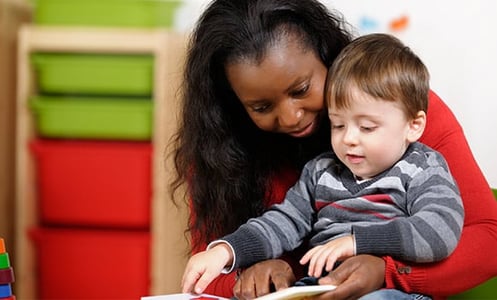
Toddlers reinforce their trust in caregivers while venturing into the world on their own. Along with stable relationships and independence, they need frequent reminders of behavioral expectations to keep themselves and their peers safe. With support and regulation, educators can help buffer the effects of stress or trauma and promote healthy child development.
Children learn best in a warm, safe environment. While positive interactions strengthen a classroom community, clear safety expectations promote healthiness. Remind children that these measures are in place because you care about them.
How to Build Relationships & Regulation in a Socially Distanced Setting
Modeling Respect for One Another
Each interaction influences a child’s emotions and behaviors. Showing children respect with a calm voice, eye contact, and respectful language can guide them to reciprocate respect with grownups and peers alike.
- Sit at children’s eye level and engage in conversations.
- Mirror children’s affect and name their emotions.
- Explain what you’re about to do—and how it’s safe—if it relates to children’s bodies.
Providing Comfort during Difficult Situations
Building trusting relationships with children allows them to accept comfort from you, and a calm emotional state promotes learning. So establishing a safe, consistent environment for children is essential to their development.
- Gently validate children’s emotions when they feel frustrated, sad, or angry.
- Offer another activity when a child is not having a good time.
- When your mask upsets a child, use it to play peekaboo. Wash your hands afterward.
Promoting Behavioral Self-Regulation
Although children are learning to self-regulate, they still need your support as they practice using their new skills. Talking about feelings and guiding children helps minimize problem behaviors in the learning environment.
- Play games identifying and naming feelings.
- Brainstorm and practice ways to deal with strong emotions.
- Use positive statements to remind children of desired behaviors.
Now that you’ve read how to develop relationships and regulation in your socially distanced classroom, use this planning document to brainstorm how you will develop your relationship and regulation in your toddler classroom.
Family members are the child’s first teachers. So caregivers should maintain a close partnership with families. Building a trusting relationship with them helps you take all necessary precautions to keep children and yourself healthy. Whether by phone, email, or text, provide opportunities for each family to share information and ideas about the developmental goals for their child. You can also schedule opportunities to share developmentally appropriate practices at home. Finally, by sharing videos of your classroom interactions, families can see you responding to their needs while promoting healthy relationships and regulation with their children.


